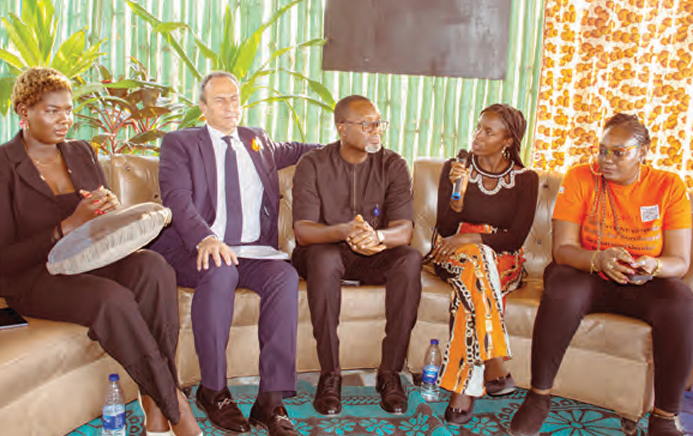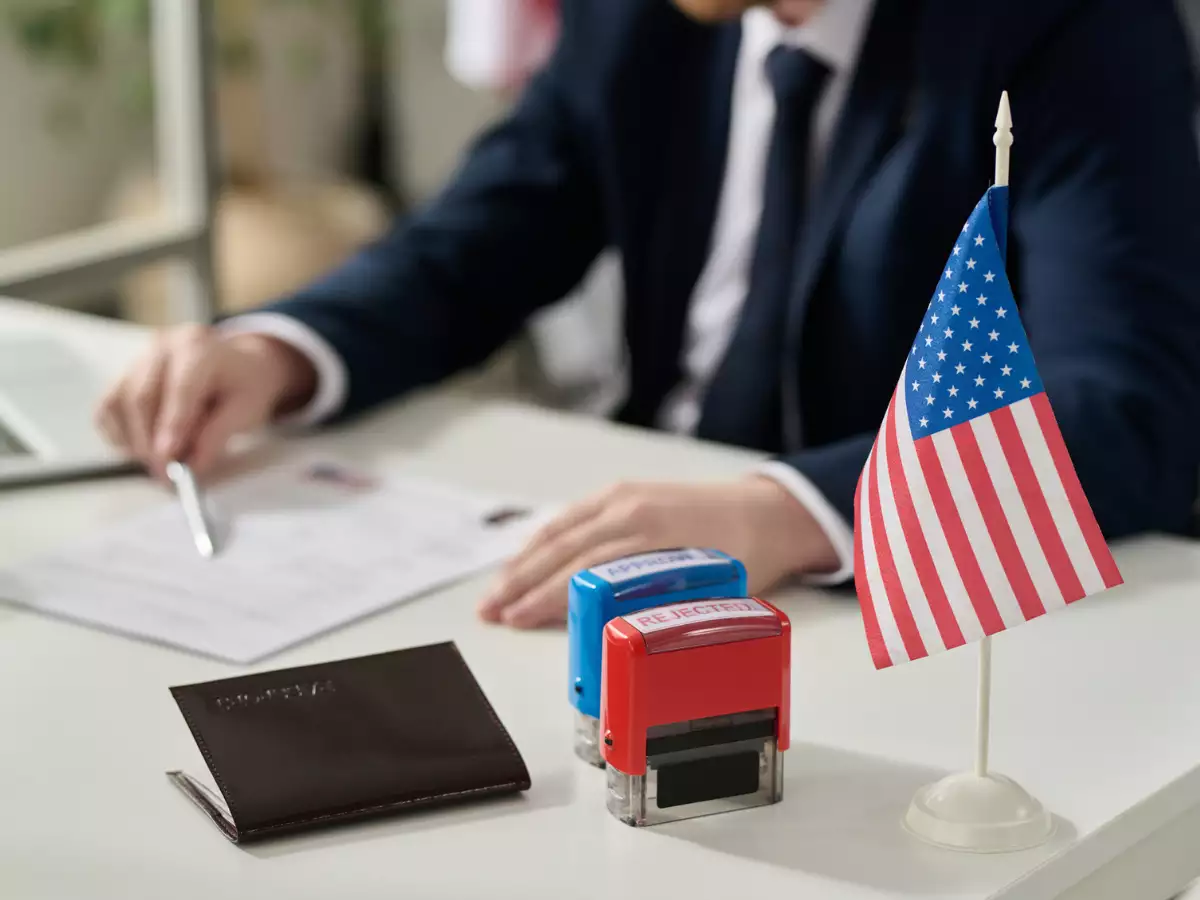Note: This story contains some unsettling images. Viewer discretion is advised.
Wakili Abdu, 63, returned from his farm at sunset in Sabon-Gida, looking uneasy. A few minutes later, he headed into the shrub behind his hut with a plastic kettle and hoe, gazed around, bent over, and pulled down his trousers.
When nature calls, Mr Abdu prefers to answer as his forefathers had taught him. He believes toilets are for women while the men should defecate in the open.
“Using toilets is a practice mainly for women. Even if toilets were built, it is mainly for women and children. We [men] prefer going to the bush, which is our traditional belief,” he told DUBAWA as he settled under a tree in front of his house.
 Mr Abdu sitting in front of his hut [ Credit Sunday AwosoroDUBAWA]
Mr Abdu sitting in front of his hut [ Credit Sunday AwosoroDUBAWA]
Mr Abdu’s reluctance to use a toilet is not uncommon in rural communities in Nigeria, where long-held cultural beliefs promote open defecation, especially among men. These traditions present a barrier to the efforts aimed at eradicating open defecation in Nigeria.
In Sabon-Gida, a community in Kafin-Hausa Local Government Area (LGA) of Jigawa, where he hails from, open defecation is a common practice despite the fact that the National Task Group on Sanitation (NTGS) and the United Nations International Children’s Emergency Funds (UNICEF) announced the entire Jigawa as Nigeria’s first and only Open Defecation-Free (ODF) state on 26 October 2022.
This announcement, widely celebrated across the state, facilitated Governor Umar Namadi’s appointment as UNICEF’s ODF ambassador.
Before the announcement, Ibrahim Hannungiwa, the state’s water resources commissioner, disclosed that Jigawa State had spent N500 million to build toilets in public places with support from UNICEF.
Nigerians need credible journalism. Help us report it.
Support journalism driven by facts, created by Nigerians for Nigerians. Our thorough, researched reporting relies on the support of readers like you.
Help us maintain free and accessible news for all with a small donation.
Every contribution guarantees that we can keep delivering important stories —no paywalls, just quality journalism.
Data from the Federal Ministry of Water Resources (FMWR) revealed that 48 million Nigerians, mostly rural community residents, defecate in the open despite the Sustainable Development Goals (SDG) introduction. In 2016, the ministry, with UNICEF’s support, launched a National Open Defecation Free Roadmap to end open defecation in Nigeria by 2025. As of Dec. 2023, only 117 out of the 774 local government areas (LGAs) in Nigeria have been declared ODF.
While acknowledging its slow progress, the FMWR stated that “Nigeria needs to build about 3.3 million toilets per year and achieve 224 ODF LGAs each year” before it can meet its 2025 target.
How was Jigawa declared ODF?
As defined by the NTGS, ODF’s primary indicator is that “all households in a community have a latrine with handwashing facilities.” Its secondary requirement is to provide water sanitation and hygiene (WASH) facilities in public places like health centres, schools, and markets.
After that, “an LGA is announced ODF when the National Task Group on Sanitation (NTGS) visits 20 per cent randomly selected communities in the LGA and confirms that all households, schools, health facilities, public places, markets, and motor parks have latrines and handwashing facilities.”
According to the NTGS, the 27 LGAs that make up Jigawa met these requirements. As reported by UNICEF, the state implemented a comprehensive strategy to achieve the Open Defecation Free (ODF) status, which included developing state and LGA-level roadmaps, declaring a state of emergency, and ensuring consistent funding for WASH departments at LGA levels.
The governor launched a campaign to end open defecation and established the Jigawa Open Defecation Award to encourage residents. He also strengthened collaboration with traditional leaders and enacted sanitation bylaws (at each LGA) that empowered the police and other security forces to enforce these laws, ensuring that violators of the open defecation ban were held accountable.
In July 2024, less than two years after the declaration, DUBAWA visited different communities across seven LGAs in Jigawa – Birniwa, Hadejia, Malam-Madari, Gwaram, Kiri Kasama, Kafin Hausa, and Guri – to verify their ODF status based on these metrics.
‘We need food before the toilets’
In Sabon-Gida, the community head reported that approximately 200 of the 2,300 households have local pit latrines, and 20 have concrete latrines, although DUBAWA did not independently verify these figures. Local latrines are cheap; residents need to place two slabs across a pit and cover the sides with mud.
Unlike in Sabon-Gida, where traditional beliefs discourage men from using toilets, residents of Taljare Village in Birniwa LGA, regardless of gender, prefer to use toilets. Unfortunately, no household in Taljare has a toilet.
Amadi Sule, the community head, attributed this to economic hardship. While they could have used local pit latrines, most have collapsed due to the rainy season. With the bush serving as an alternative, the community has stopped seeking other solutions.
“Well, we had them (toilets) before, but they are now collapsed due to the rainy season because we do not apply cement on them. We prefer toilets, it’s just that we cannot afford them now. We struggle to feed our families, not to build toilets for them. Feeding is our priority,” he said.
 Muhammed Bulama’s local pit latrine [Photo Credit Sunday AwosoroDUBAWA]
Muhammed Bulama’s local pit latrine [Photo Credit Sunday AwosoroDUBAWA]
“As you may know, building toilets involves money. While people are struggling with the current economic turmoil, they are looking for ways to feed their families rather than building toilets that we consider unnecessary. Most of those using bush toilets are extremely poor, but there are some with local clay ones which usually collapse or get full due to their poor condition,” he stated.
Water collapses our latrines
All seven LGAs DUBAWA visited reported that their locally-built latrines frequently collapse during the rainy season, forcing them to rebuild every six months. This problem is particularly severe in Karidu village, where the topography causes groundwater to seep into the pits, most of which collapse in two months.
In 2023, WASH Jigawa State constructed a local latrine for each of the 500 households in Karidu, Guri LGA. However, Karidu’s waterlogged terrain means that any attempt to dig a pit often results in the collapsing of the pit. Some residents tried burying jerrycans, but these quickly filled up without a proper evacuation plan. As a result, the community has reverted to open defecation, with 400 of the originally installed latrines now collapsed.
“We are soliciting the government to intervene through the provision of cement and other items that can help our toilets to last long,” Maimuna Muhammad, a mother of four, pleaded.
 Maimuna Muhammed pointing at a collapsed latrine in her compound [Photo Credit Sunday AwosoroDUBAWA]
Maimuna Muhammed pointing at a collapsed latrine in her compound [Photo Credit Sunday AwosoroDUBAWA]
Sensitisation with no enforcement
To kick start its battle against open defecation, the state government launched a state-wide campaign and said it had introduced by-laws criminalising the practice in each local government. Residents confirmed the campaign and the law’s enactment, with some reporting that they received various forms of intervention. However, after this initial push, the government’s presence faded, and they have seen little to no further action. Residents confirmed that no one has ever been arrested or penalised for defecating in the open. WASH officials fail to show this reporter the law being referred to and it is not publicly available.
In 2021, the government conducted a sensitisation campaign in Gabasmari village, Birniwa LGA, where residents previously saw no reason to build toilets. During the visit, officials educated the community on the dangers of open defecation and provided detergents and kettles. This prompted some villagers to construct local latrines, but like in other communities, many of these structures have since collapsed.
Usman Galadima, one of the campaign stakeholders in the village, said the villagers initially adopted the end-open-defecation initiative but later abandoned it “due to lack of support from the government.”
 Mr Galadima’s pit toilet was behind this hut before it collapsed [Photo Credit Sunday AwosoroDUBAWA]
Mr Galadima’s pit toilet was behind this hut before it collapsed [Photo Credit Sunday AwosoroDUBAWA]
“They only sensitised us and provided us with detergents and kettles. I can assure you that if the government sustains its gesture, people will embrace it and refrain from open defecation,” he noted.
Like Gabasmari, residents of Duleri, Taljare, Matamu, and Aljari in Birniwa LGA, Garin-Ando in Kiri-Kasama LGA, and Aji-Bukara and Karidu in Guri LGA, who reported similar interventions, are now faced with the same challenges.
As part of the intervention efforts, residents of Matamu were asked to pay N700 per household for the construction of local pit toilets. Sanin Magini, the village head, said no villager could afford it.
“I can allocate land for it, but if I have to pay, I don’t actually have the money. I can even allocate land right now if someone volunteers to build it for me,” he said.
Schools are not exempted
Jigawa State, through UNICEF’s Sanitation Hygiene and Water in Nigeria (SHAWN) project, installed a water facility for the Matamu Primary School. However, the facility has stopped working. Likewise, portions of the male and female pit toilets have collapsed. Pupils have now resorted to defecating in the handwashing stations, behind the toilet buildings, and in the classrooms’ backyard. Unfortunately, DUBAWA could not speak to any teacher as the school had closed for the day.
 Taljari Primary School’s toilets are not functioning [Photo Credit Sunday AwosoroDUBAWA]
Taljari Primary School’s toilets are not functioning [Photo Credit Sunday AwosoroDUBAWA]
“They all go to the bush since there is no toilet. They (the government) built the toilet, but they eventually abandoned it. The toilets have now collapsed due to lack of proper sustenance,” he said.
The situation at Day Secondary School Sabon-Gida is also troubling, with pupils defecating in abandoned classrooms as the school toilets are out of order.
At Matsaro Primary School in Hadejia (Hadejia LGA), only the teachers have functioning toilets, while students are left to defecate behind their classrooms.
In Madachi, although the concrete pit toilets at Govt. Day Secondary School remain functional, those at the primary school have collapsed.
 Students defecate inside and behind classrooms at Sabon Gida Sec School, Madachi Pry School, and Matsaro Primary School in Hadejia [Photo Credit Sunday AwosoroDUBAWA]
Students defecate inside and behind classrooms at Sabon Gida Sec School, Madachi Pry School, and Matsaro Primary School in Hadejia [Photo Credit Sunday AwosoroDUBAWA]LGA headquarters improve
The central communities of the seven LGAs visited have indeed improved on open defecation. Most houses are modern, unlike the traditional mud houses found in the villages. Additionally, many of these modern homes are equipped with built-in toilets, and few people with mud houses have made concrete pit latrines. But people still defecate by the roadside, dump sites, and uncompleted buildings.
In Hadejia, private toilet operators in the market and motor park charge N50 for urination and N100 for defecation. Despite this, some people still defecate by the roadside or within the market, a situation also observed in Malam-Madari, Malam-Madari LGA.
 Human faeces found around Hadejia Central Market [Photo Credit Sunday Awosoro DUBAWA]
Human faeces found around Hadejia Central Market [Photo Credit Sunday Awosoro DUBAWA]
 Image of a boy washing off his faeces into drainage at Investigate Motor Park Dutse [Photo Credit Sunday AwosoroDUBAWA]
Image of a boy washing off his faeces into drainage at Investigate Motor Park Dutse [Photo Credit Sunday AwosoroDUBAWA]
 Current condition of Malam Umar Maladi Motor Park, Guri [Photo Credit Sunday AwosoroDUBAWA]
Current condition of Malam Umar Maladi Motor Park, Guri [Photo Credit Sunday AwosoroDUBAWA]Hospitals face the same issue
Not all the communities visited by DUBAWA had access to health facilities. In some areas, residents had to walk up to an hour to reach the nearest healthcare services. However, Sabon-Gida and Matamu were exceptions, as both had Primary Health Care (PHC) facilities. Unfortunately, like the schools in these communities, the facilities’ toilets were non-functional.
In Matamu PHC, the outdoor latrines and indoor water closets had long been abandoned. DUBAWA found the facility unattended, with no one present to explain the situation.
Abdullahi Gamani, the Officer in Charge at Sabon-Gida PHC, explained that their pit latrine had developed a plumbing issue in April, which led to its complete blockage.
‘‘The problem started three months ago due to the pipe leakage between the toilet bowl and soakaway. We even tried to fix it, but we have yet to achieve that, which is why we blocked the toilet. We don’t have a toilet, but we have a hole where people can urinate and bathe. We need total renovation.”
Upon assuming his role as Officer in Charge, Mr Gamani collaborated with community members to renovate the toilet but realised the issue was beyond his capacity.
 The state of Sabon-Gida and Matamu PHCs [Photo Credit Sunday AwosoroDUBAWA]
The state of Sabon-Gida and Matamu PHCs [Photo Credit Sunday AwosoroDUBAWA]Government officials speak
In Jigawa State, officials struggle to maintain the Open Defecation Free (ODF) status due to several challenges. Abba Tahir, a WASH facilitator in the state, noted that while progress has been made in changing behaviours, using temporary latrines often leads residents back to old habits when these structures fail.
“What I’m trying to say is that if you’re looking for those areas that used to do this thing outside, it’s very simple. Any local government, you can go to the ward. They have small villages, and they have that kind of attitude of doing the open defecation outside,” he said.
“The problem of sustainability is something. When we did this project, they used to call us and express their gratitude that things had changed and their town was now clean. But sustainability is what matters. There’s no provision for building advanced latrines that could last longer for them. The village heads and household members are the ones who usually contribute to dig local latrines for themselves,” he added.
Corroborating DUBAWA’s findings, Isyaku Umar, WASH Coordinator for Birniwa LGA, noted that sustaining ODF status has been challenging in some communities due to heavy rains that have caused many latrines to collapse. He mentioned that Birniwa’s WASH department received N100,000 monthly for vehicle maintenance from January to August 2024, intended for monitoring visits. However, residents say they had never seen WASH officials in their communities after the initial sensitization.
Mr Umar also mentioned that they occasionally recruit local partners within different communities, offering them N1,000 to help with sensitisation efforts. However, despite having a bylaw in place, they are unable to enforce penalties on those practising open defecation or households without toilets. He attributed this to Nigeria’s economic hardships and the potential for violent resistance from residents.
“This time is a time that each and every person in the communities is looking for what they are going to eat. They may not even listen, and you can’t force them. That is what we are going through. It can lead to trouble if we try to punish someone,” he said.
Ado Isah, WASH Coordinator for Kafin Hausa LGA, maintained the same narrative, saying offenders are not punished but only encouraged to adopt toilet use. He said that open defecation is only happening in riverine areas and communities with flooding problems. Unlike Mr Umar of Birniwa, he said that they have not received the N100,000 for vehicle maintenance for over two and a half years which is hindering their monitoring responsibility.
“No, people there cannot be punished. We regularly advise them to make a latrine in their place. Sometimes, flooding demolishes the community, and people move from one place to another. They cannot build permanent toilets. Other places are still maintaining ODF except for those with flooding challenges. They’re trying to upgrade from local to concrete.”
DUBAWA’s several attempts to reach Abubakar Sidi, the Acting Director of the Rural Water Supply and Sanitation Agency (RUWASA), Jigawa, were unsuccessful. He did not return calls and messages.
READ ALSO: ANALYSIS: The Unstreamed Potential: Challenges facing Nigeria’s streaming market
UNICEF speaks
Chiranjeevi Tiwari, UNICEF’s Officer in Charge of WASH, attributed the situation in Jigawa to a slippage, where communities initially meet ODF criteria but regress due to factors like population growth, migration, or toilet infrastructure collapse. He, however, promised to discuss the problem with the UNICEF office in Kano State, noting that UNICEF only supports the government with resources and not individual households.
Mr Tiwari also noted that UNICEF’s limited resources have not been focused on Jigawa since it was declared open-defecation-free. He emphasised that maintaining ODF status is the responsibility of the state and local governments in Jigawa.
“Sometimes, if the donor funding to, let’s say, Jigawa has ended, we might not have an intensive programme in Jigawa. That’s the challenge we also have because our resources are also limited. We focus on the areas where the work has to be done. Once the work is done, it’s the responsibility of the government to sustain it so that it doesn’t really slip back or it doesn’t fall down,” he said.
‘ODF certificate could be withdrawn’ – Ministry of Water Resources
In an interview with DUBAWA, Okpara Chisoma, the national coordinator for Open Defecation at the Federal Ministry of Water Resources and Sanitation, also addressed the concern of slippage in Jigawa’s open defecation-free status. She expressed disappointment, saying,
“It is really disheartening that a whole lot of work has been done trying to sensitise and all that, and then just when you have been declared open defecation free, we are hearing that.”
While Ms Chisoma confirmed that a sustainability discussion is ongoing, she stressed the need for continuous monitoring and community involvement, highlighting that the state, local government, traditional rulers, private sectors, and media are responsible.
“So again, we need to sustain it, and the only way to sustain it is to ensure that it is followed up bumper to bumper, by the local government, by the state, in our mosques, in our churches, and then ensuring that it is happening. A lot of responsibility rests on them to sustain what has been achieved,“ she said.
When asked how the ministry handles cases of slippage, Ms Chisoma explained that the National Task Group on Sanitation (NTGS) has a “national verification and certification protocol” that mandates periodic assessments after areas are declared open defecation-free. She noted that the open defecation certificate could be withdrawn if the status is not sustained.
DUBAWA also contacted Adeyemi Ajose, the Officer in Charge of NTGS. He declined an interview, saying that all requests should be channelled through the Ministry of Water Resources.
Support PREMIUM TIMES' journalism of integrity and credibility
At Premium Times, we firmly believe in the importance of high-quality journalism. Recognizing that not everyone can afford costly news subscriptions, we are dedicated to delivering meticulously researched, fact-checked news that remains freely accessible to all.
Whether you turn to Premium Times for daily updates, in-depth investigations into pressing national issues, or entertaining trending stories, we value your readership.
It’s essential to acknowledge that news production incurs expenses, and we take pride in never placing our stories behind a prohibitive paywall.
Would you consider supporting us with a modest contribution on a monthly basis to help maintain our commitment to free, accessible news?
TEXT AD: Call Willie - +2348098788999

















 English (US) ·
English (US) ·